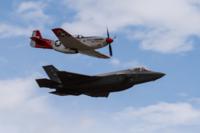In Commemoration of Memorial Day, Military.com is profiling veterans who gave their all in war and peacetime.
Pulling sailors from beneath fallen debris, dodging deadly flames and scrambling to find survivors, Dwight Vickers was fighting off shock after a Japanese kamikaze pilot smashed through the deck of the USS Saratoga, the plane exploding in the hanger.
As a machine mate, operating near a 140-degree boiler room, Vickers was accustomed to the rigors of warfare in the Pacific during World War II. But dealing with a plane exploding in your carrier hangar wasn’t something that was covered in the Navy manual.
“There were a lot of casualties, and he was right in the middle of it. He had to pull some guys out of the wreckage,” Vickers’ son, Kendall Vickers, told Military.com upon recalling his father’s service.
The kamikaze attack occurred during the famous Iwo Jima amphibious assault in 1945. The venerable Saratoga, first commissioned in the late 1920s, was a battlecruiser- turned-carrier, and one of just a few U.S. pre-war carriers to serve all the way through World War II. Although the attack caused enough damage for the ship to return home for repairs, it survived, and was modified into a training carrier. Ultimately it was used to ferry troops back to the United States after the Japanese surrender.
While the elder Vickers did not speak much about the trauma of this particular kamikaze attack, he was known to tell his three sons -- Kendall, Keith and Kyle -- about the importance of serving the U.S. in wartime. He never made much of the difficult conditions in which he served, which included long shifts beneath the deck.
“He would go days or weeks without ever going topside. Topside was dangerous, so they often lived like moles,” Kendall said.
"They Did What They Had to Do"
Kendall was so proud of his father’s service that he wore his dad’s sailor cap to school as a kid.
“I was always fascinated. I wore my dad’s sailor cap to school. I always wanted to be a sailor,” Kendall said, explaining the source of his inspiration to join the Navy himself during Vietnam.
Kendall says his father never thought much of his own service because he considered it to be a normal patriotic thing that most people did during World War II. The Vickers family lived in a small farming town in Southwestern Missouri.
“Most of my dad’s friends had been in the service. Nobody bragged about it because everybody had been in Europe or Japan,” Kendall said. “Nobody talked about it in those days. They all felt like they did what they had to do.”
According to Kendall, Dwight was lucky enough not to be psychologically damaged by the kamikaze attack, but did say he knew his father suffered intensely during the incident.
“The flight deck caved in. It was like a giant stepped on the deck and crushed it in,” he said. “They thought they would be sunk.”
Upon returning home, Dwight Vickers resumed his duties as a farmer, married a woman named Eula Mae and started a family.
Kendall’s voice fills with pride when describing his father’s service, recalling how he learned about the kamikaze attack.
“I learned about it in his cruise book,” he said. “I’d look at his cruise book, and, for some reason, the Navy really appealed to me. We spent time milking cows, and he told me what it was like,” Kendall said.
Like Father, Like Son
Years later, Kendall himself entered Naval service in the early 1970s onboard a destroyer—the USS Porter Field. “My teacher for my first four grades had served on the same ship in World War II,” Kendall recalled.
While making a point to emphasize that he himself did not experience much in the way of intense combat during the war, Kendall did, like his father, feel a calling to serve in the Navy. Kendall served on the edge of the Saigon River, in Saigon, in an area that later was overrun by the Viet Cong.
The Navy found a way to put Kendall’s farming expertise to use in Vietnam. “We raised pigs and sent them out to bases,” Kendall said. His unit fell underneath the umbrella of “psychological warfare,” and some of his comrades dropped leaflets and other propaganda.
Like many Vietnam veterans, Kendall is acutely aware of the difficulties service members faced when they returned home but said his return to Dederick, Missouri was not problematic.
“I was never disrespected coming home to Missouri. The military was respected, and I did not run into any of the negative receptions you hear about,” Kendall explained.
While the Vickers may be one family from the rural Midwest, their experience is emblematic of many American sacrifices being honored on Memorial Day.















